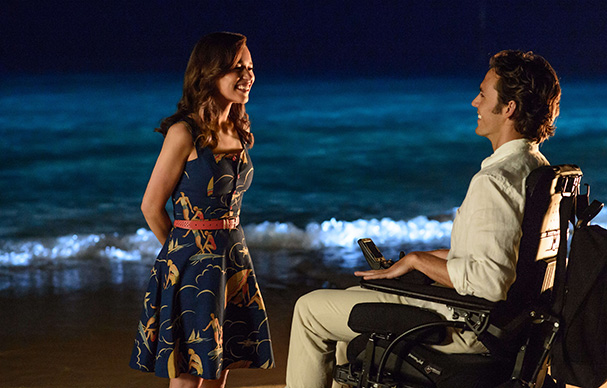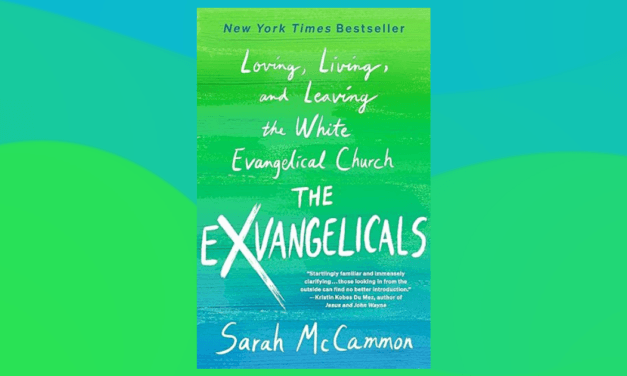A film review of
Me Before You
Directed by Thea Sharrock
(Warner Bros., 2016)
There is a scene in the new film Me Before You where the heroine of the story, Lou, walks into a beautiful apartment. A young woman gently ushers her into the main room. Through the bedroom door, we see the parents of Will Traynor sitting next to their quadriplegic son. The entire room and everyone in it are bathed in white and light grey and filtered sunlight. The surroundings are so peaceful and warm that it is easy to forget that this scene exists to facilitate the death of an individual who is not terminally ill. Will isn’t dying; his life is being intentionally ended because he is deeply unhappy. His unhappiness is understandable; even so, that is why his family is paying for him to die. He isn’t terminally ill. He is terminally unhappy.
In the film, Will Traynor is a good-looking, wealthy, and intelligent young man whose spinal chord is irreparably damaged when a motorcycle strikes him as he crosses the street chasing a cab. He cannot accept his new life as a quadriplegic facing profound physical limitations, pain, and recurring episodes of pneumonia that undermine his efforts to rehabilitate what is left of his upper body function. He is determined to end his life even after meeting and falling in love with Louisa Clark (Lou), a quirky, young working-class woman from his hometown whom his mother employs in the hopes her companionship can help Will find the desire to live. He eventually argues that his death is his gift to Lou to free her from the bonds her devotion to him would place on her life. It seems a strange way to say “I love you.”
He is committed to dying because he used to be an athletic, adventurous, sexual player with considerable resources to thrill-seek in stunning international locales. One cynically could conclude if Will had been introverted, clumsy, and less attractive, the tragedy of his loss might have been more bearable for him. There is frequent mention of how much pain he is in, but it is difficult to determine whether this is primarily psychological pain. At one point Nathan, Will’s in-home medical healthcare provider, illustrates Will’s suffering for Lou by explaining Will often dreams he is his old self skiing, then endures the pain of waking up to this terrible reality. That is reason enough for Nathan to voice his full understanding of Will wanting to die.
The primary moral justification offered to support the choice for suicide is that this is Will’s decision, a direct appeal to the principle of autonomy. In this regard, Me Before You continuously begs the question in relation to the issue of physician-assisted suicide (PAS). All protestations are met with assurances that this is simply Will’s choice. No character is ever asked to argue whether this is a morally legitimate choice. No alternative voice is offered from other people living with this same condition that enjoy life. The film assumes the very thing that must be argued in continuously framing the issue as a settled matter of autonomy.
Are there objective moral reasons that it might be wrong for parents, friends, or society to participate in facilitating suicides? Does this foster a felt duty to die in the members of our society that are more medically or physically dependent? Does embracing suicide produce a contagion effect triggering the most psychological vulnerable in our communities? These are all fair criticisms of PAS that never are considered, because Will’s autonomy is a universal defeater. Competing ethical considerations such as nonmaleficence (do no harm), beneficence (attend to the patient’s good), and justice never garner a mention. Choice is everything from the outset, and all that is left is for the objecting characters to learn to deal with that reality.
The current U.S. laws permitting PAS focus on patients that are terminally ill, have been seen by two physicians that verify that death is imminent and would entail great suffering, and that are psychologically in their right mind to make the request. I discussed this issue at greater length in a Christian Research Journal print article.1 No state legally protects the kind of suicide portrayed in Me Before You.
That doesn’t mean portrayals like this are harmless. They use so-called romantic movies to move us a step closer to normalizing this category of PAS for which supporters such as bioethicist Jacob M. Appel already actively advocate. It isn’t the stuff of fiction. Will is based on the real life of a twenty-three-year-old Englishman named Daniel James who procured an “accompanied suicide” from Dignitas, the Zurich-based suicide providers portrayed in the film, in 2008, a mere eighteen months after suffering his injuries.2 Dignitas even has provided suicide services to completely healthy people that wish to die with their terminally ill spouses.3
The strongest objection in the film comes from Lou as she tearfully condemns Will’s decision as selfish. However, the more our culture communicates through law, film, and literature that profoundly disabled and dependent individuals in our society live a lesser life that can be heroically escaped through suicide, the less the charge of selfishness makes sense. Many advocates for the disabled argue that an intentional message is being communicated: it is better to be dead than like them.4 If that message is being perceived, intentional or not, then the suicidal desires are not selfish. Profoundly disabled individuals who seek to end their lives are merely succumbing to an idea that has been communicated repeatedly to them. This is exactly the danger perceived by disabled-rights activists. Even some PAS supporters like George F. Will see this as a compelling concern, writing in an article last year that this “culture of casual death…should deepen worries about a slippery slope from physician-assisted dying to a further diminution of life’s sanctity.”5
Some people whom I respect have called for a boycott of Me Before You. I don’t go that far. I think it is helpful to be aware of how cultural influencers are framing their messages in order to engage them effectively in an impactful way. Viewers do need to be aware that this movie offers very little hope and a confused idea of love. The only outspokenly Christian character in the film is subtly marginalized and dismissed. There is little recognition of how, far from burdening Lou’s life, loving Will appears to be a positive and character-building experience for her. This is consistent with the experiences of many of the people in my life who see caring for their disabled loved ones as a privilege and unexpected blessing that strengthened their whole family.
I reject the premise of this movie’s justification for assisted suicide. Life is not a choice. Life is a fact. Unfortunately, it occasionally can be a painful and difficult fact. We ought to feel deep empathy for fellow image bearers of God who are facing permanent disability. They deserve the best we can offer to help them overcome the circumstances that threaten to crush them emotionally and spiritually, while working to equip them to share the full human experience. That empathy, however, must never be turned into a license to kill. —Jay Watts
Jay Watts is vice president of Life Training Institute. He speaks at universities, high schools, and churches across the United States and participates in numerous radio and television interviews on the subject of the value of human life.
NOTES
- Jay Watts, “Death with Dignity and the Imago Dei,” Christian Research Journal 38, 6 (2015): 40–45, http://www.equip.org/article/death-dignity-imago-dei/.
- Robert Booth, “He Wasn’t Prepared for a Second-Class Life’: Why Injured Rugby Star Went to Switzerland to Die,” The Guardian, October 17, 2008, https://www.theguardian.com/uk/2008/oct/18/11.
- Jacob M. Appel, “Next/Assisted Suicide for Healthy People,” Huffington Post Politics, August 16, 2009, http://www.huffingtonpost.com/jacob-m-appel/assisted-suicide-for-heal_b_236664.html.
- William Peace, “A Second Class Existence: Me Before You Gets It All Wrong,” Bad Cripple, http://badcripple.blogspot.com/2016/05/a-second-class-existence-me-before-you.html?spref=fb.
- George F. Will, “The Growing Acceptance of Assisted Suicide,” The Mercury Columns, August 31, 2015, http://www.pottsmerc.com/article/MP/20150831/NEWS/150839984.









